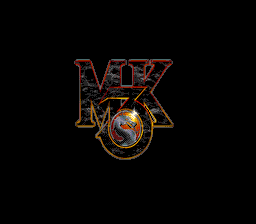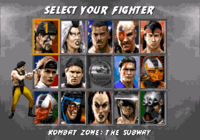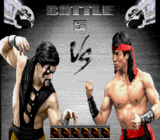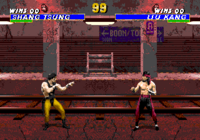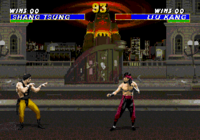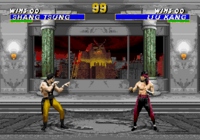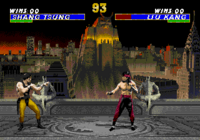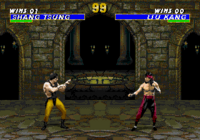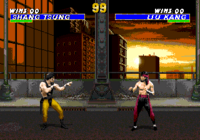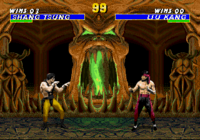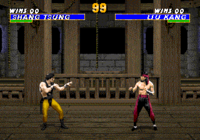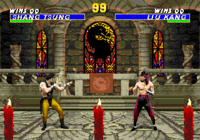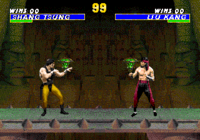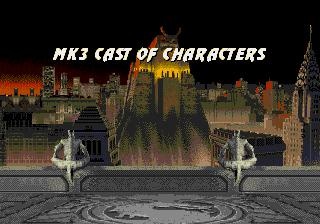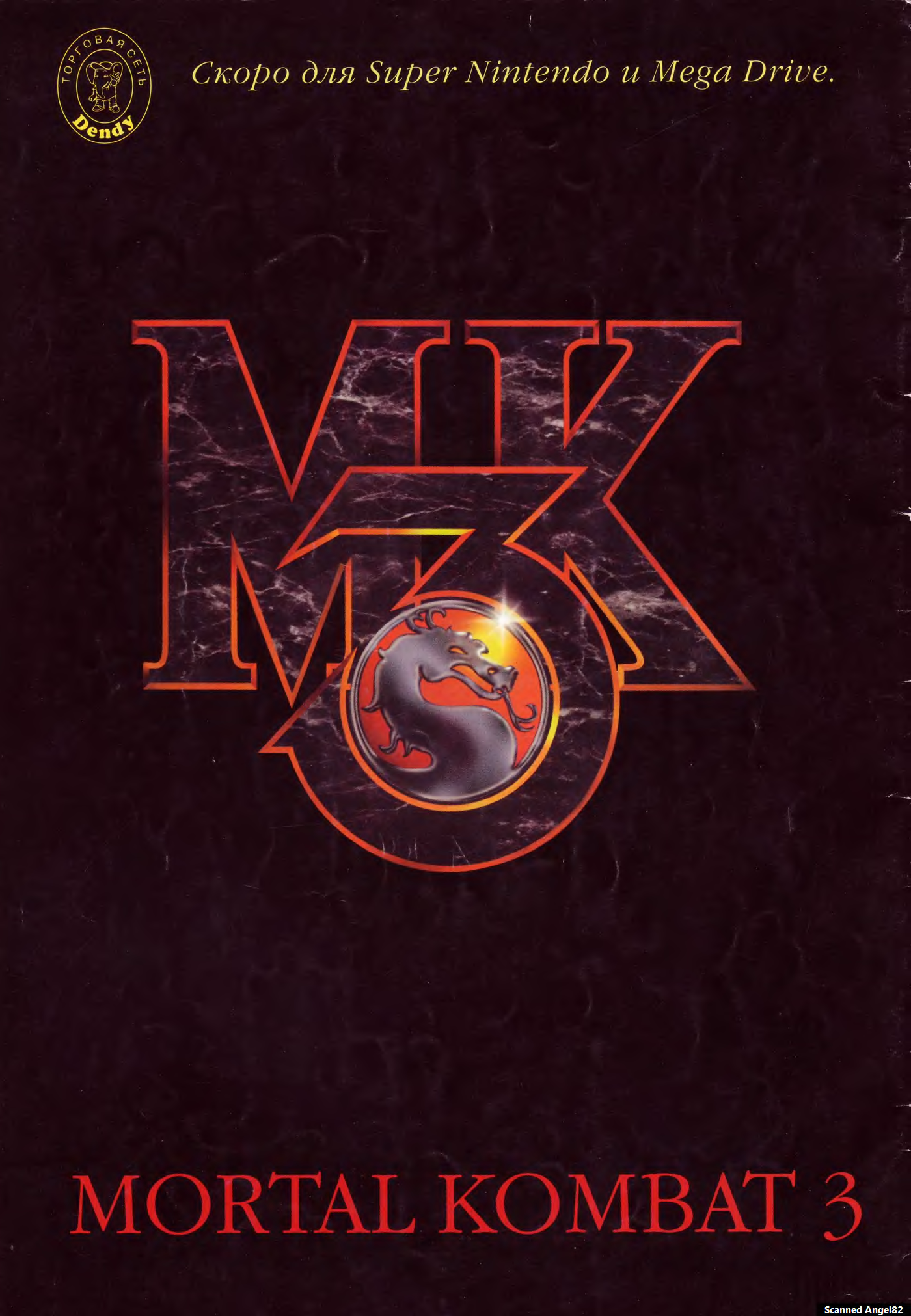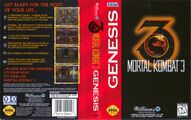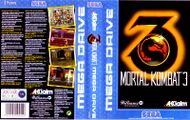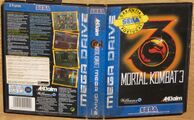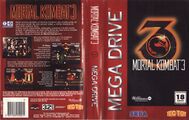Difference between revisions of "Mortal Kombat 3"
From Sega Retro
(→Gameplay: modes subsection) |
|||
| Line 50: | Line 50: | ||
Another concept introduced in this game is the "Kombat Kode," a six-symbol code entered at the "Vs" screen in a two-player game to modify gameplay, fight hidden characters, or display certain messages. | Another concept introduced in this game is the "Kombat Kode," a six-symbol code entered at the "Vs" screen in a two-player game to modify gameplay, fight hidden characters, or display certain messages. | ||
| − | |||
| − | |||
Characters move with {{left}} and {{right}} and crouch with {{down}}. They jump with {{up}} and flip back and forth with {{upleft}} and {{upright}}. All characters have punches and kicks that can either be aimed high or low. Characters perform a low punch with {{A}}, a high punch with {{X}}, a low kick with {{C}}, and a high kick with {{Z}}. Characters can run by holding {{Y}}; they can only run forwards. The Run meter is drained both by running and by performing combos, but the meter replenishes quickly if not used for a second. Characters block by holding {{B}}. Blocking can be done while standing or crouching. Some attacks cannot be blocked while standing (such as sweeps). All attacks do a small amount of damage even when blocked. | Characters move with {{left}} and {{right}} and crouch with {{down}}. They jump with {{up}} and flip back and forth with {{upleft}} and {{upright}}. All characters have punches and kicks that can either be aimed high or low. Characters perform a low punch with {{A}}, a high punch with {{X}}, a low kick with {{C}}, and a high kick with {{Z}}. Characters can run by holding {{Y}}; they can only run forwards. The Run meter is drained both by running and by performing combos, but the meter replenishes quickly if not used for a second. Characters block by holding {{B}}. Blocking can be done while standing or crouching. Some attacks cannot be blocked while standing (such as sweeps). All attacks do a small amount of damage even when blocked. | ||
| Line 58: | Line 56: | ||
Each character has two Fatalities, a Friendship, and a Babality, with a new kind of finishing move known as an Animality introduced, where the character transforms into an animal before killing off the defeated opponent. To perform an Animality, the player must first perform a Mercy, another new feature where the character can restore a tiny amount of their opponent's health bar after winning two rounds. If the opponent is defeated again, an Animality can be performed. Finally, three new stage-specific Fatalities are also present. | Each character has two Fatalities, a Friendship, and a Babality, with a new kind of finishing move known as an Animality introduced, where the character transforms into an animal before killing off the defeated opponent. To perform an Animality, the player must first perform a Mercy, another new feature where the character can restore a tiny amount of their opponent's health bar after winning two rounds. If the opponent is defeated again, an Animality can be performed. Finally, three new stage-specific Fatalities are also present. | ||
| + | |||
| + | ===Modes=== | ||
| + | {{ScreenThumb|Mortal Kombat 3 MD, Choose Your Destiny.png|width=200|Choose Your Destiny}} | ||
| + | In single-player games, after selecting a character, players choose a "tower" (Novice, Warrior, or Master), which determines the order and number of opponents fought before reaching the final bosses, Motaro and Shao Kahn. A second player can challenge the first by pressing {{Start}} during gameplay, with the winner continuing in the tournament. Before each fight, if two players enter a certain sequence of codes before the fight begins, one of several different effects can be enabled, such as the disabling of certain moves, having the winner of the match skip directly to one of the final opponents, or starting a mini-game. | ||
| + | |||
| + | There are five difficulty settings for computer-controlled opponents (Easiest, Easy, Medium, Hard, and Hardest). | ||
===Characters=== | ===Characters=== | ||
Revision as of 08:49, 2 November 2024
- For the Sega Master System and Sega Game Gear game, see Mortal Kombat 3 (8-bit). For the unreleased Sega Saturn version, see Mortal Kombat 3 (Saturn).
| Mortal Kombat 3 | ||||||||||||||||||||||||||||||||||||||||
|---|---|---|---|---|---|---|---|---|---|---|---|---|---|---|---|---|---|---|---|---|---|---|---|---|---|---|---|---|---|---|---|---|---|---|---|---|---|---|---|---|
| System(s): Sega Mega Drive | ||||||||||||||||||||||||||||||||||||||||
| Publisher: Williams Entertainment (US) | ||||||||||||||||||||||||||||||||||||||||
| Developer: Midway Manufacturing | ||||||||||||||||||||||||||||||||||||||||
| Distributor: Ecofilmes (PT), Roadshow New Media (AU), Tec Toy (BR), Consumer Electronics (ZA) | ||||||||||||||||||||||||||||||||||||||||
| Licensor: Midway Manufacturing | ||||||||||||||||||||||||||||||||||||||||
| Developer(s) of original games: Midway Manufacturing | ||||||||||||||||||||||||||||||||||||||||
| Sound driver: GEMS | ||||||||||||||||||||||||||||||||||||||||
| Peripherals supported: Six Button Control Pad, Mega Net 2 | ||||||||||||||||||||||||||||||||||||||||
| Genre: Action | ||||||||||||||||||||||||||||||||||||||||
| Number of players: 1-2 | ||||||||||||||||||||||||||||||||||||||||
| ||||||||||||||||||||||||||||||||||||||||
|
Mortal Kombat 3 is a fighting game and is the sequel to Mortal Kombat II. It was initially released in arcades in 1995, then it was brought to various consoles, including the Sega Mega Drive.
Contents
Story
Weary of continuous losses in tournament battle, Shao Kahn, who lost to Liu Kang in the Outworld tournament in the previous game, enacts a 10,000-year-old plan. He would have his Shadow Priests, led by Shang Tsung, revive his former Queen Sindel, who unexpectedly died at a young age. However, she would not be revived in the Outworld, but in Earthrealm. This would allow Shao Kahn to cross the boundary lines and reclaim his queen. When Sindel is reincarnated in Earthrealm, Shao Kahn reaches across the dimensions to reclaim her, and as a result, Earthrealm gradually becomes a part of Outworld, stripping billions of their souls. Only a few are spared, protected by Rayden. He tells them that Shao Kahn must be stopped, but he cannot interfere; due to his status, he has no power in Outworld, and Earthrealm is partially merged with Outworld. Shao Kahn has unleashed extermination squads to kill any Earthrealm survivors. Rayden's protection only extends to the soul, not to the body, so his chosen warriors have to fight the extermination squads and repel Shao Kahn.
Gameplay
Mortal Kombat 3 builds further on the gameplay of the previous games. Characters are also now able to run towards each other with the use of a dedicated button, although use of this move is limited by a Run meter displayed under the character's health bar. A combo system is also introduced in this game, with the game displaying the number of hits and damage inflicted. All characters have their own specific chain combos performed by hitting a certain sequence of buttons while close to the opponent. These button sequences are sometimes called "dial-a-combos" since they follow a pre-programmed order and cannot be interrupted once one hit connects (as long as they are entered quickly enough). Some chain combos end with an uppercut or another move that knocks the opponent into the air so that more damage can be dealt via a traditional juggle combo.
Certain stages allow characters to uppercut each other through the ceiling, where both characters continue the battle in a different stage. This can alter the game's stage cycle. Both normal uppercuts and uppercuts that are part of a ground combo can result in a stage change (Kung Lao's Whirlwind Spin move can also have the same effect). However, there is no stage change if the character is defeated by an uppercut.
Another concept introduced in this game is the "Kombat Kode," a six-symbol code entered at the "Vs" screen in a two-player game to modify gameplay, fight hidden characters, or display certain messages.
Characters move with ![]() and
and ![]() and crouch with
and crouch with ![]() . They jump with
. They jump with ![]() and flip back and forth with
and flip back and forth with ![]() and
and ![]() . All characters have punches and kicks that can either be aimed high or low. Characters perform a low punch with
. All characters have punches and kicks that can either be aimed high or low. Characters perform a low punch with ![]() , a high punch with
, a high punch with ![]() , a low kick with
, a low kick with ![]() , and a high kick with
, and a high kick with ![]() . Characters can run by holding
. Characters can run by holding ![]() ; they can only run forwards. The Run meter is drained both by running and by performing combos, but the meter replenishes quickly if not used for a second. Characters block by holding
; they can only run forwards. The Run meter is drained both by running and by performing combos, but the meter replenishes quickly if not used for a second. Characters block by holding ![]() . Blocking can be done while standing or crouching. Some attacks cannot be blocked while standing (such as sweeps). All attacks do a small amount of damage even when blocked.
. Blocking can be done while standing or crouching. Some attacks cannot be blocked while standing (such as sweeps). All attacks do a small amount of damage even when blocked.
When using a standard three-button control pad, characters perform a low punch with ![]() , a high punch with
, a high punch with ![]() +
+![]() , a low kick with
, a low kick with ![]() , and a high kick with
, and a high kick with ![]() +
+![]() . They run by holding START and block by holding
. They run by holding START and block by holding ![]() .
.
Each character has two Fatalities, a Friendship, and a Babality, with a new kind of finishing move known as an Animality introduced, where the character transforms into an animal before killing off the defeated opponent. To perform an Animality, the player must first perform a Mercy, another new feature where the character can restore a tiny amount of their opponent's health bar after winning two rounds. If the opponent is defeated again, an Animality can be performed. Finally, three new stage-specific Fatalities are also present.
Modes
In single-player games, after selecting a character, players choose a "tower" (Novice, Warrior, or Master), which determines the order and number of opponents fought before reaching the final bosses, Motaro and Shao Kahn. A second player can challenge the first by pressing START during gameplay, with the winner continuing in the tournament. Before each fight, if two players enter a certain sequence of codes before the fight begins, one of several different effects can be enabled, such as the disabling of certain moves, having the winner of the match skip directly to one of the final opponents, or starting a mini-game.
There are five difficulty settings for computer-controlled opponents (Easiest, Easy, Medium, Hard, and Hardest).
Characters
Note: Move lists assume that the character is facing right. When facing left, ![]() and
and ![]() should be reversed.
should be reversed.
| P | Any punch button |
| LP | Low punch |
| HP | High punch |
| K | Any kick button |
| LK | Low kick |
| HK | High kick |
| BL | Block |
| RN | Run |
All characters can perform roundhouse kicks with ![]() + HK (which knock the opponent across the screen), leg sweeps with
+ HK (which knock the opponent across the screen), leg sweeps with ![]() + LK (which cause the opponent to fall down), and uppercuts with
+ LK (which cause the opponent to fall down), and uppercuts with ![]() + HP (which knock the opponent high into the air). Throws are performed by pressing LP when next to the opponent.
+ HP (which knock the opponent high into the air). Throws are performed by pressing LP when next to the opponent.
When using a standard three-button control pad on the Mega Drive version, for moves requiring LP , hold the direction and LP simultaneously. For moves requiring HP , release the direction before pressing LP . Special moves requiring LP + HP can be done with just LP . Uppercuts are performed with ![]() + LP .
+ LP .
If the match goes to three rounds, players can offer defeated opponents Mercy as an alternative to a finishing move by pressing HOLD RN ![]()
![]()
![]() . This allows the other player to recover a sliver of health and continue fighting.
. This allows the other player to recover a sliver of health and continue fighting.
Fatalities often require being a certain distance from the opponent in order to execute. Each character has a special button combination for performing the stage-specific Fatalities on the Subway, Bridge, and Pit 3 stages. Friendships and Babalities can only be performed if the player does not block during the final round. Animalities can only be performed if the player grants the opponent Mercy first.
Playable
Mortal Kombat 3 makes significant changes to the game's cast, with even returning characters such as Sub-Zero sporting a very different look. The game has reduced the number of palette-swapped characters from the previous game; only the "cybernetic ninja" robots share sprites.
Jax, Kano, Kung Lao, Liu Kang, Shang Tsung, Sonya Blade, and Sub-Zero return from the previous games (with Kano and Sonya returning after being absent from Mortal Kombat II). Johnny Cage, Scorpion, Reptile, and Rayden are notably absent after appearing in both previous entries.
Cyrax, Kabal, Nightwolf, Sektor, Sheeva, Sindel, and Stryker make their debuts.
| Shang Tsung | |||||||||||||||||||||||||||||||||
|---|---|---|---|---|---|---|---|---|---|---|---|---|---|---|---|---|---|---|---|---|---|---|---|---|---|---|---|---|---|---|---|---|---|
Shao Kahn's lead sorcerer. Despite his multiple failures trying to deliver Earth to his master Shao Kahn, the scheming sorcerer has convinced Kahn to grant him more power than ever before.
| |||||||||||||||||||||||||||||||||
| Sindel | |||||||||||||||||||||||||||||||||
| Shao Kahn's wife and the Queen of Outworld before her death 10,000 years ago. She has been reborn on Earth. | |||||||||||||||||||||||||||||||||
| Jax (Major Jackson Briggs) | |||||||||||||||||||||||||||||||||
A special forces soldier. He fitted both of his arms with bionic implants in preparation for the impending Outworld invasion.
| |||||||||||||||||||||||||||||||||
| Kano | |||||||||||||||||||||||||||||||||
| A criminal thought to have been killed in the first tournament. He convinces Shao Kahn to spare his soul before the Outworld invasion, proposing to teach Kahn's warriors how to use Earth's weapons. | |||||||||||||||||||||||||||||||||
| Liu Kang | |||||||||||||||||||||||||||||||||
A Shaolin monk. As the Shaolin Champion, he finds himself the prime target of Shao Kahn's extermination squads.
| |||||||||||||||||||||||||||||||||
| Sonya Blade | |||||||||||||||||||||||||||||||||
A special forces soldier who disappeared after the first tournament. She was rescued by Jax, and the two prepare for Shao Kahn's invasion after failing to convince the government of the threat.
| |||||||||||||||||||||||||||||||||
| Kurtis Stryker | |||||||||||||||||||||||||||||||||
A riot control police officer and the lone survivor of a major city after Shao Kahn's invasion.
| |||||||||||||||||||||||||||||||||
| Sub-Zero | |||||||||||||||||||||||||||||||||
| A ninja, once a member of the Liu Kuei clan. He is now hunted by cybernetic assassins from his former clan after escaping their betrayal. | |||||||||||||||||||||||||||||||||
| Cyrax | |||||||||||||||||||||||||||||||||
Unit LK-4D4, the second of three prototype cybernetic ninjas built by the Lin Kuei. Like the other cyborgs, he has been programmed to find and terminate the rogue ninja Sub-Zero.
| |||||||||||||||||||||||||||||||||
| Sektor | |||||||||||||||||||||||||||||||||
Unit LK-9T9, the first of three prototype cybernetic ninjas built by the Lin Kuei. He was once a human assassin but volunteered to be turned into a cyborg because of his loyalty to the clan.
| |||||||||||||||||||||||||||||||||
| Nightwolf | |||||||||||||||||||||||||||||||||
| A Native American historian who uses his shaman magic to protect his tribe's land against the Outworld invasion. | |||||||||||||||||||||||||||||||||
| Sheeva | |||||||||||||||||||||||||||||||||
Sindel's personal protector, chosen by Shao Kahn. She is a Shokan, like Goro and Kintaro.
| |||||||||||||||||||||||||||||||||
| Kung Lao | |||||||||||||||||||||||||||||||||
A Shaolin monk. His plans to reform the White Lotus Society are disrupted by Shao Kahn's invasion. Alongside Liu Kang, he embarks on a journey to end Shao Kahn's treachery.
| |||||||||||||||||||||||||||||||||
| Kabal | |||||||||||||||||||||||||||||||||
| An unknown warrior who is kept alive by respirators. He is thought to be a survivor of an attack by Shao Kahn's extermination squads. He fights with two hook swords. |
Bosses
The boss characters can be played in two-player games by enabling the Killer Codes menu with a cheat code. They cannot crouch, run, or use finishing moves (and finishing moves cannot be used against them).
Hidden
- Main article: Mortal Kombat 3/Hidden content.
| Smoke | |||||||||||||||||||||||||||||||||||||||||||||||||||
|---|---|---|---|---|---|---|---|---|---|---|---|---|---|---|---|---|---|---|---|---|---|---|---|---|---|---|---|---|---|---|---|---|---|---|---|---|---|---|---|---|---|---|---|---|---|---|---|---|---|---|---|
Unit LK-7T2, the last of three prototype cybernetic ninjas built by the Lin Kuei. Smoke was captured and turned into a cyborg while his friend Sub-Zero escaped. He is an hidden character who can be unlocked to play or to fight by using cheat codes. As in his previous appearance, he constantly emits smoke. His special moves are taken from Scorpion, Sektor, and Reptile. While Smoke was kept a secret in the arcade version, he is openly mentioned in the manual for the Mega Drive port.
| |||||||||||||||||||||||||||||||||||||||||||||||||||
| Noob Saibot | |||||||||||||||||||||||||||||||||||||||||||||||||||
| A dark, silhouetted warrior. He uses a blackened version of Kano's sprite (since there are no traditional Lin Kuei ninjas in this game). He has no special moves but uses some of Kano's combos. He can be fought using a code. |
Stages
The stages are played in order (and loop around after the last one). Motaro is fought in the Balcony and Shao Kahn is fought in the Pit 3. The Subway, Bell Tower, and Pit 3 stages have stage-specific Fatalities.
Three stages are accessed by uppercutting an opponent through the ceiling of another stage: the Street is above the Subway, the Rooftop is above the Bank, and the Balcony is above the Soul Chamber.
History
Release
Like the previous games, the third game was banned and the only available version was the one on the Game Boy. The game was unbanned in 2005.
Versions
Despite being the more technically advanced game, the Mega Drive Mortal Kombat 3 is a closer match to its arcade counterpart than its two immediate predecessors, Mortal Kombat and Mortal Kombat II were to theirs. The port is again limited by the lack of on-screen colours, and much lower sound quality than the arcade version, however the latter also applies to the Super NES port, whose sound is noticeably more muffled than other versions of the game.
Some of the finer details in the Mega Drive version, such as the HUD and menus (not to mention the larger resolution), are more accurate than on the Super NES, however while the Mega Drive version retains more of the arcade game's character animation, the larger colour palette of the Super NES generally leads to a better looking game. Content-wise the two are identical. Both versions are missing the Graveyard stage from the arcade version.
Production credits
- Kano and Kabal: Rich Divizio
- Sonya: Kerri Hoskins
- Jax: John Parrish
- Kung Lao: Tony Marquez
- Stryker: Michael O'Brien
- Sub-Zero and Shang Tsung: John Turk
- Sindel: Lia Montelongo
- Liu Kang: Eddie Wong
- Nightwolf and Sektor: Sal DiVita
- Cyrax and Smoke: Sal DiVita
- Shao Kahn: Brian Glynn
- Ed Boon, John Tobias, Steve Beran, Dan Forden, Tony Goskie, Dave Michicich, John Vogel
- Lead Programmer: Jim Henn
- Programmers: Patrick Alphonso, Mike Crandall, Paul Blagay
- Art Manager: Gary Penacho
- Sound and Drivers: Chris Braymen, Roy Wilkins
- Artists: Neil Melville, Jeff Knight, Mary Scriven, Mike Lott, Kent Barney
- Art Conversion: Jim 'Crash' Jung
- Director: Jeff Peters
- Development Tools: Ned Martin, Adam Clayton, Jim Henn, Rob Nelson, Mike Callahan, Patrick Alphonso
- Testing Manager: Gary Rowberry
- Night Shift Manager: Garon Galloway
- Graveyard Shift Manager: Chandler Holbrook
- Game Testers: John Howa, Scott Hanks, Chris Olsen, Ben Nielson, Greg Murphy, Ryan McBride, David Hanks, Ryan Milligan, Jason Humphrey, Tristan Bracken
- Special Thanks to: John Blackburn, Todd Blackburn, Scott Perras, Altair Lane, Kevin Alphonso, Leanne Hornbuckle, Bill Trail, Chad Korb, Amy the Dither Monkey
- Manual Design and Production: Debbie Austin, Steve High, Shawn Murphy
- Quality Control: Brian Johnson, Williams Entertainment Testing
Magazine articles
- Main article: Mortal Kombat 3/Magazine articles.
Promotional material
also published in:
- Consoles + (FR) #51: "Février 1996" (1996-0x-xx)[6]
also published in:
- Strana Igr (RU) #2: "Mart 1996" (1996-xx-xx)[7]
Physical scans
| Sega Retro Average | ||||||||||||||||||||||||||||||||||||||||||||||||||||||||||||||||||||||||||||||||||||||||||||||||||||||||||||||||||||||||||||||||||||||||||||||||
|---|---|---|---|---|---|---|---|---|---|---|---|---|---|---|---|---|---|---|---|---|---|---|---|---|---|---|---|---|---|---|---|---|---|---|---|---|---|---|---|---|---|---|---|---|---|---|---|---|---|---|---|---|---|---|---|---|---|---|---|---|---|---|---|---|---|---|---|---|---|---|---|---|---|---|---|---|---|---|---|---|---|---|---|---|---|---|---|---|---|---|---|---|---|---|---|---|---|---|---|---|---|---|---|---|---|---|---|---|---|---|---|---|---|---|---|---|---|---|---|---|---|---|---|---|---|---|---|---|---|---|---|---|---|---|---|---|---|---|---|---|---|---|---|---|
|
| 88 | |
|---|---|
| Based on 28 reviews | |
Technical information
- Main article: Mortal Kombat 3/Technical information.
External links
- Sega of America webpage: Mega Drive
References
- ↑ EGM², "September 1995" (US; 1995-0x-xx), page 21
- ↑ 2.0 2.1 2.2 Sega Magazine, "October 1995" (UK; 1995-09-12), page 92
- ↑ 3.0 3.1 3.2 3.3 Sega Power, "November 1995" (UK; 1995-09-21), page 32
- ↑ Computer Trade Weekly, "" (UK; 1995-10-16), page 32
- ↑ File:Mortal Kombat 3 MD credits.pdf
- ↑ Consoles +, "Février 1996" (FR; 1996-0x-xx), page 129
- ↑ Strana Igr, "Mart 1996" (RU; 1996-xx-xx), page 87
- ↑ 1700 igr dlya Sega, "" (RU; 2001-xx-xx), page 137
- ↑ Alaab Alcomputtar, "" (SA; 1996-xx-xx), page 18
- ↑ Consoles +, "Novembre 1995" (FR; 1995-1x-xx), page 94
- ↑ Cool Gamer, "9" (RU; 2002-10-13), page 132
- ↑ Entsiklopediya luchshikh igr Sega. Vypusk 1, "" (RU; 1999-xx-xx), page 336
- ↑ Entsiklopediya luchshikh igr Sega. Vypusk 10, "" (RU; 2003-10-08), page 96
- ↑ GameFan, "Volume 3, Issue 10: October 1995" (US; 1995-xx-xx), page 17
- ↑ GamePro, "November 1995" (US; 1995-xx-xx), page 78
- ↑ GamePro, "November 1995" (UK; 1995-09-xx), page 61
- ↑ Game Informer, "October 1995" (US; 1995-xx-xx), page 10
- ↑ Hobby Consolas, "Octubre 1995" (ES; 1995-xx-xx), page 70
- ↑ Joypad, "Novembre 1995" (FR; 1995-11-03), page 52
- ↑ Mean Machines Sega, "November 1995" (UK; 1995-09-29), page 86
- ↑ Next Generation, "November 1995" (US; 1995-10-24), page 187
- ↑ Player One, "Novembre 1995" (FR; 1995-1x-xx), page 68
- ↑ Players, "Nov 95" (BR; 1995-xx-xx), page 38
- ↑ Random Access (UK) (+0:00)
- ↑ Secret Service, "Grudzień 1995" (PL; 1995-12-xx), page 24
- ↑ Sega Pro, "November 1995" (UK; 1995-10-05), page 36
- ↑ Sega Pro, "July 1996" (UK; 1996-05-xx), page 22
- ↑ Sega Mega Drive Review, "2" (RU; 1996-01-03), page 81
- ↑ Sega Megazone, "Summer '95/'96" (AU; 1995-xx-xx), page 34
- ↑ Super Juegos, "Octubre 1995" (ES; 1995-xx-xx), page 50
- ↑ Todo Sega, "Diciembre 1995" (ES; 1995-1x-xx), page 38
- ↑ Tricks 16 bit, "Tricks Sega Gold 800 igr" (RU; 1998-03-20), page 120
- ↑ VideoGames, "October 1995" (US; 1995-09-19), page 81
| Mortal Kombat 3 | |
|---|---|
|
Main page | Comparisons | Hidden content | Magazine articles | Video coverage | Reception | Region coding | Technical information | Bootlegs
| |
| Mortal Kombat games for Sega systems | |
|---|---|
| Mortal Kombat (1993) | Mortal Kombat II (?) | Mortal Kombat 3 (1995) | Ultimate Mortal Kombat 3 (1996) | |
| Mortal Kombat (1993) | Mortal Kombat II (1994) | Mortal Kombat 3 (1996) | |
| Mortal Kombat (1994) | |
| Mortal Kombat II (?) | |
| Mortal Kombat II (?) | Mortal Kombat 3 (unreleased) | Ultimate Mortal Kombat 3 (1996) | Mortal Kombat Trilogy (1997) | |
| Mortal Kombat Gold (?) | |
| Unlicensed Mortal Kombat games for Sega systems | |
| Mortal Kombat 5 (1999) | |
- Six Button Control Pad-compatible games
- 1-2 player games
- US Mega Drive games
- All US games
- EU Mega Drive games
- All EU games
- PT Mega Drive games
- All PT games
- UK Mega Drive games
- All UK games
- AU Mega Drive games
- All AU games
- BR Mega Drive games
- All BR games
- ZA Mega Drive games
- All ZA games
- Mega Drive games
- 1995 Mega Drive games
- All 1995 games
- Mega Drive action games
- All action games
- All games
- Old-style rating (gamesmaster)
- Rating without PDF source
- Update ratings template
- 1 old ratings
- Mortal Kombat 3
- Mortal Kombat (franchise)
- Tectoy Mega Net games
- Sega Channel games
